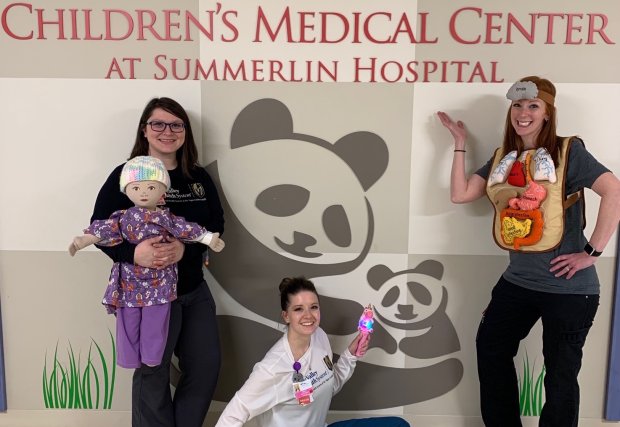Children’s Medical Center at Summerlin Hospital Celebrates Child Life Month

Some of the child life specialists at Children's Medical Center at Summerlin Hospital.
March marks a special month of recognition and celebration for Summerlin Hospital’s team of child life specialists. Using developmentally appropriate play and education techniques, child life specialists help children and adolescents cope with the stress and uncertainty of hospitalization.
Whether it be an inpatient admission or an outpatient visit, child life specialists can help. Child life specialists have the training and expertise to provide support in a variety of healthcare settings and have recently been able to expand their services to support the newly dedicated Pediatric Hematology/Oncology Unit and the Outpatient Surgery Department. “Children and adolescents visiting these areas of the hospital have unique needs," says Jacquie MacLeod, certified child life specialist (CCLS) at Summerlin Hospital. "Child life specialists collaborate with other members of the multidisciplinary team to help meet the individual psychosocial needs of the patient and promote family-centered care throughout the facility."
Children and adolescents diagnosed with a chronic condition benefit from many of the supportive services that child life specialists can provide. From new diagnosis education using child friendly teaching techniques, to continued support through ongoing treatment, child life specialists help to “decode” the unfamiliar world of the hospital. In addition to education, child life specialists also focus on the development of healthy coping skills, opportunities for self-expression, and normalizing the environment through play/recreation.
“We tailor our interactions to meet the developmental and emotional needs of each patient. In doing so, we are often able to increase a child’s understanding of what is happening while also giving them the tools to actively participate in their care and tell their story,” says MacLeod, who provides coverage on the Pediatric Hematology/Oncology Unit. “To be able to build supportive relationships with our patients over time and watch as they overcome challenging circumstances is one of the most rewarding aspects of our job.”
In contrast, working in the Outpatient Surgery Department requires a child life specialist to build quick rapport to support patients and families arriving at the hospital on the day of their procedure. One day per week, Erika Ellsworth, CCLS, spends time with children and families in the pre-operative area, prior to surgery, to help prepare them for what to expect and clarify any misconceptions they might have. Providing opportunities for children to play with basic medical equipment and having the option to choose a fun scent for their anesthesia mask helps to reduce related anxiety. She also often accompanies children from the pre-operative area to the OR to continue the calm and playful interaction until the child has received anesthesia.
"The surgical area has been so much fun to add to the areas I cover," says Ellsworth. "Many of the families are anxious on surgery day. It's nice to be able to ease those fears as much as I can, and sometimes even help make the experience fun for them. The medical team is also so wonderful and has been incredibly welcoming and receptive to the additional support and different approaches that I bring." In addition to the Pediatric Hematology/Oncology Unit and the Outpatient Surgery Department, the child life specialist team at Children’s Medical Center provides coverage to the Inpatient Pediatric Unit, Pediatric Intensive Care Unit, Pediatric Emergency Department, and Outpatient Pediatric Sedation Services.
Certified child life specialists have bachelor's or master's degrees, have completed a minimum 600-hour clinical internship, and have achieved an exam-based professional certification issued by the Child Life Certification Commission, a subsidiary of the Association of Child Life Professionals.
